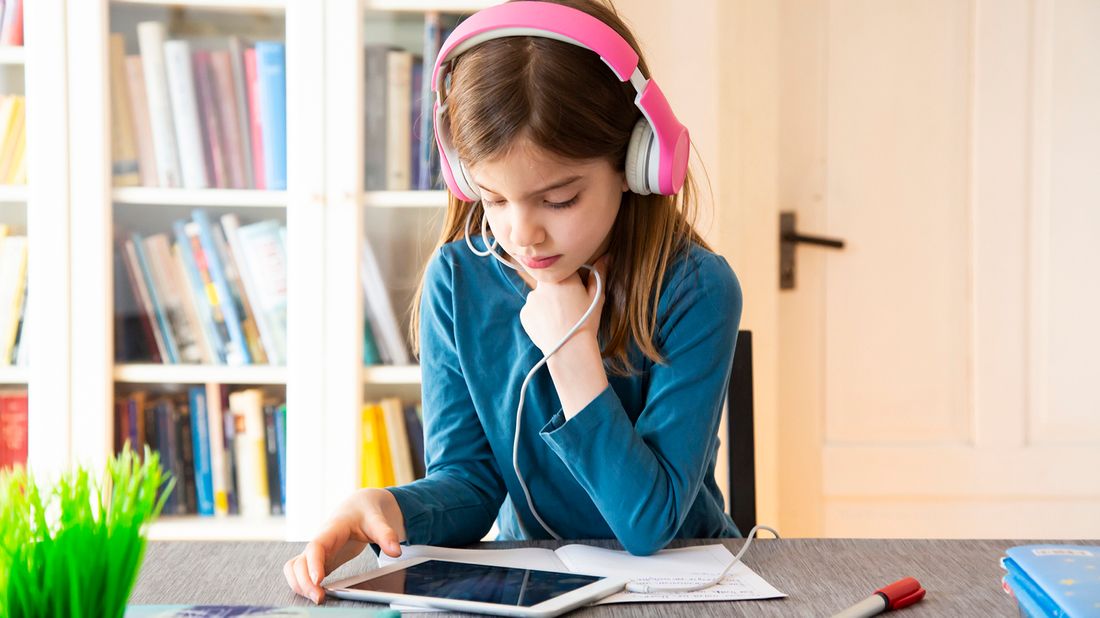Educational Websites and Apps for Kids That Can Help You With Home-Schooling

Your kids’ schools are likely closed by now, so you may be looking to bridge the education gap they are experiencing or want to augment the homeschooling they’ve already started.
In either case, now may be a good time to turn to technology. After all, not many parents have the time or resources to create lesson plans from scratch — especially when so many are trying to work from home simultaneously.
“I suspect in this ‘new normal,’ many of us will rely on screens more than we did before,” says Eleanor Strumolo, a teacher and math department chair for a New York City private school. “I think as long as we’re doing it thoughtfully, that’s OK.”
To start, follow the advice of your children’s teachers if they’re providing suggestions for remote learning. Then look to other educational experts to know which digital resources are the most reputable, Strumolo suggests.
And as with all good things, moderation is key. “My general rule of thumb is that 30 minutes at a time on a screen is probably a good limit for anyone at any age, no matter how positive the resource,” Strumolo says.
Here are some educational websites and apps for kids to help them learn while school’s out for the foreseeable future.
-
KHAN ACADEMY
One of the gold standards in online learning, Khan Academy was doing it before online learning became a thing. The company has increased the capacity of its website to accommodate heavier usage, with lessons that incorporate online and offline learning. Classes remain free and the company has created webinars and other resources to help parents learn how to use Khan Academy in their kids’ remote learning. -
PINNA
With Pinna you’ll find audio books, podcasts and music for kids ages 3 to 12. The streaming audio service is currently extending its free trial period to 60 days with a promo code due to the coronavirus outbreak. -
PBS KIDS
For activities and tips to ensure your kids are learning and playing, sign up for the new PBS KIDS newsletter, which was created for families whose schools have closed. You can also download the PBS KIDS Video app to stream shows, as well as the PBS KIDS Games app, which has games for kids ages 2 to 8 that feature well-known characters such as Daniel Tiger and Super Why. Both apps are free. -
COUNTING WITH KIDS
This Instagram account is run by a math director who’s also a mom, and has creative projects to teach complex ideas in fun ways. You’ll learn how to make simple math lessons out of everyday objects, from cereal-box puzzles to a number hop on your kitchen floor made with painter’s tape. -
GO NOODLE
Work in a “recess” break to help your little ones burn off some energy with the GoNoodle app (stream it to your TV for optimum viewing). Schools lean on GoNoodle for rainy days, and for good reason: The videos, designed to get your kids moving, are funny and catchy. Before you know it, you’ll be grooving to the beats. You can’t get to the gym anyway, so you may as well burn some calories in your living room. -
OUTSCHOOL
To benefit public-school students affected by closures, education company Outschool is offering their pay-by-class services for free. To get started, enter your school’s details and you’ll be charged $1, which will be refunded once you attend your first class. Outschool is asking families who can afford it to pay for some classes so they can support the teachers and ensure there are enough classes available for those who need them. -
DIY.ORG
This app actually helps kids spend time away from their screens. DIY.org teaches children ages 6 to 16 skills related to topics ranging from astronomy to engineering, and encourages them to share their offline project results later with the online community. Your kids are sure to find something they’re interested in from among the library of ideas and how-to's. -
MINECRAFT
There’s a good chance your kids already love this game. Minecraft helps teach kids about spatial relations, resource management and creative community participation, as kids often build realms together. To help kids stuck at home, the game maker recently announced it would offer free educational worlds that players can download from the Minecraft Marketplace.
Finally, amid all the formal lessons, don’t underestimate using apps like FaceTime, Skype or Zoom to create more informal ways to learn and connect. Maybe it’s a group lesson with friends over videoconferencing, or a grandparent reading your kids a story. “Any screen time that promotes community is perhaps the most important way to deploy these devices — and is the greatest benefit to living in a digital era during a time of high stress and social isolation,” Strumolo says. So don’t hesitate to turn on those computers, phones or tablets and reach out.
Related Articles
Feel better about taking action on your dreams.
Your advisor will get to know what’s important to you now and years from now. They can help you personalize a comprehensive plan that gives you the confidence that you’re taking the right steps.
Find your advisor




